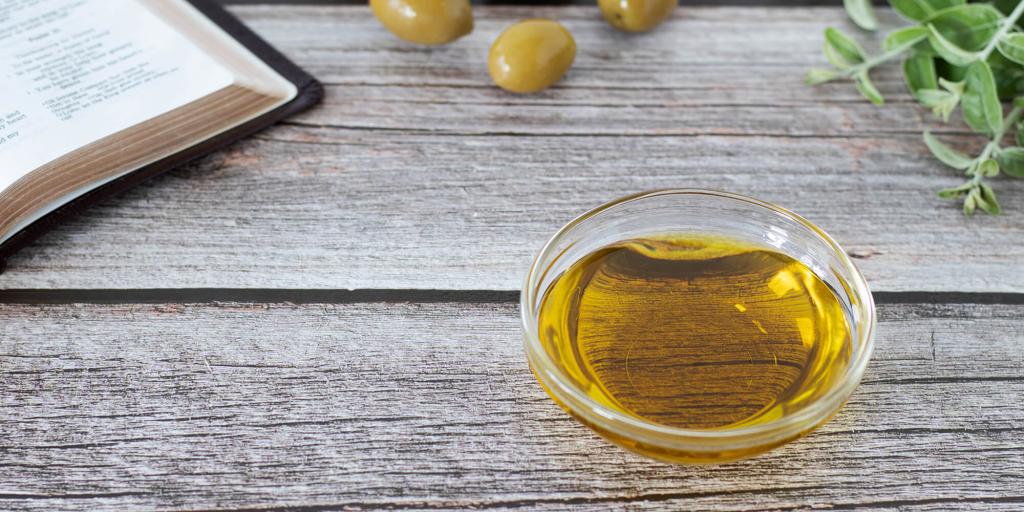
Olive Oil: A Biblical Symbol
Olive oil has been used for millennia and is well regarded for many health benefits. This golden liquid, treasured by ancient cultures and modern chefs alike, plays a very important role throughout the pages of the Bible.
Extra Virgin Olive Oil (EVOO) contains predominately healthful monounsaturated fatty acids, most notably oleic acid. It also contains polyphenols with anti-inflammatory benefits and antioxidant properties against oxidative cellular damage from free radicals. It can have many benefits for heart health as well, and EVOO is an excellent salad dressing and cooking oil!
Olive trees are grown in many countries surrounding the Mediterranean Sea. Spain, Italy, Greece, and Tunisia are the largest olive oil producers, but other nations growing olives include Australia, Argentina, Chile, China, and the United States.
The olive branch has long been a symbol of peace, which, along with the dove, hearkens back to the biblical account of Noah and the flood (Genesis 8:8–12).
Oil is first mentioned in Genesis 28:18 when Jacob poured oil (Strong’s H8081: fat, oil, olive oil) on the rock he slept on when he had the dream about the ladder reaching to heaven. He set the rock as a pillar representing God’s house and vowed to give a tenth to God of all he received. Years later, Jacob returned to Bethel at God’s command and again anointed a pillar stone at Bethel (Genesis 35:14–15).
Decades later, the Promised Land was “a land of olive oil” (Deuteronomy 8:8). In the exodus from Egypt, God gave Israel many instructions for the Tabernacle service, which included “oil for light (for the lamps) and spices for the anointing oil” (Exodus 25:6). The oil was to be “pure oil of pressed olives for the light” (Exodus 27:20).
Oil was used to anoint priests, the unleavened cakes for offerings (Exodus 29), the Tabernacle, the ark, and many things dedicated to the Lord. The holy anointing oil was to be olive oil infused with quality spices. The recipe was holy and was not to be copied for ordinary use on punishment of death (Exodus 30:23–33). Later, kings were anointed. The Messiah (“anointed one”) is King of kings (Revelation 19:16) and “a great High Priest” (Hebrews 4:14).
Anointing someone signified their being consecrated for a divine purpose. James instructs Christians who are sick to call for the elders of His Church to be anointed with oil in the name of the Lord (James 5:14). While EVOO has anti-bacterial properties and helps promote healing of wounds (e.g., Luke 10:34), it is used symbolically when anointing the sick to represent God’s Spirit, love, and power to heal, Christ having suffered the stripes in His body for our healing (1 Peter 2:24).
The parable of the ten virgins concerns a central lesson about being wise, watchful, prepared, and filled with God’s holy spirit (having enough oil) to keep their lamps burning (Matthew 25:1–13).
The prophet Zechariah was given a vision of a lampstand (symbolizing the Lord) and two olive trees on each side of the lampstand. It was only revealed that two trees represented the two anointed ones who stand beside the Lord of the whole earth (Zechariah 4:1–5, 11–14). In Revelation 11, it is further revealed to John that the two end-time witnesses are “the two olive trees and two lampstands standing before the God of the earth” (v. 4). They will prophesy for forty-two months and are given great miracle-working power (v. 3–12).
Jesus spent a good deal of time on the Mount of Olives during His ministry. When Jesus comes back, His feet will stand again on the Mount of Olives (Zechariah 14:4). Will you be ready for His return?
Related to this topic, you may find the free study guides Biblical Principles of Health and Does God Heal Today? of interest. Also be sure to watch the telecast “What IS the Gospel Jesus Preached?”
Stay up to date with our Weekly Digest Email!
Tomorrow's World ComMentary Podcast
Subscribe to Tomorrow's World Commentary podcasts on iTunes and Google Play!



